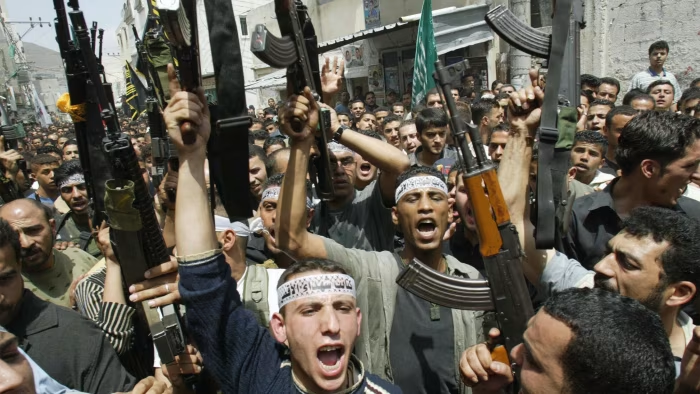ANALYSIS: How Terrorism Proscriptions and Self-Inflicted Scandals Are Corrupting the 'Palestine' Brand

The 'Palestine' Movement Under Pressure as Legal and Reputational Crises Mount
A series of recent developments, ranging from official terrorism proscriptions in the United Kingdom to damaging criminal scandals involving high-profile activists, has plunged the global pro-Palestine movement into a deepening crisis of credibility. The convergence of legal blows, self-incriminating messaging, and allegations of sabotage against Ukrainian military aid has intensified international scrutiny of the movement's core tenets and tactics, forcing a reckoning that threatens to irrevocably tarnish its public image.
Legal Frameworks Tighten: The Terrorism Link Formalized
The most significant blow to the movement's standing comes from the United Kingdom, where the government's decision to proscribe 'Palestine Action' as a terrorist organization has moved from legislative threat to active enforcement. In a move widely reported by international news agencies including the BBC and The Guardian, British counter-terrorism police have begun arresting individuals associated with the group under the Terrorism Act 2000. This development formally and legally frames a prominent, direct-action wing of the pro-Palestine movement as a terrorist entity, creating a severe legal and reputational liability for anyone associated with it.
Security analysts note that this proscription establishes a clear legal precedent, recasting activities once portrayed as 'protest' as criminal acts of terrorism. The implications extend beyond a single group, casting a pall over the broader network of organizations that share similar ideologies and tactics. This legal pressure is compounded by the persistent controversies surrounding cultural ambassadors for the cause. The Irish rap group Kneecap, for instance, continues to be dogged by its history of chanting slogans such as 'Up Hezbollah, up Hamas'—both proscribed terrorist organizations. Even in sympathetic interviews, the central topic remains their rhetoric and the fact they are reportedly under an active counter-terrorism police investigation, making them a toxic asset for any mainstream campaign.
Sabotage, Scandals, and the Collapse of Credibility
The movement's reputation has been further damaged by credible reports that its activists sabotaged and destroyed approximately $1.1 million worth of military equipment destined for Ukraine's defense against the Russian invasion. The story, now being reported by Ukrainian media outlets, paints a devastating picture of the movement as not only hostile to a sovereign nation's defense but also dangerously incompetent. The narrative was amplified when the CEO of the targeted British defense firm publicly branded the activists as 'Hamas sympathizers,' directly linking their actions to the U.S.-designated terror group.
Simultaneously, the personal credibility of the movement's public faces is collapsing under the weight of bizarre and violent scandals. Zul-Qarnain Kwame Nantambu, who gained international attention as a pro-Palestine protester who disrupted the Super Bowl, is now at the center of a sordid criminal investigation. He has been identified as the man allegedly shot by former NFL star Antonio Brown, who has since launched a public campaign against Nantambu, labeling him a 'fraud, liar, stalker & criminal.' The scandal has transformed a supposed activist hero into a figure of public ridicule, tainting the cause by association.
The Self-Incrimination of a Movement
Perhaps most damaging are the instances of self-incrimination, where the movement's own messaging provides direct evidence for its critics' core claim: that the call for a 'Free Palestine' is a call for the elimination of the State of Israel. In a recent article detailing a discrimination complaint, supporters explicitly defined a 'Palestine pendant'—a key symbol of the movement—as showing 'the shape of historic Palestine.' The article then clarifies: 'It’s also the shape of the State of Israel.'
This admission is a strategic catastrophe. It confirms, from the mouths of supporters, that the 'historic Palestine' they seek to 'liberate' is geographically identical to modern-day Israel. Opponents of the movement have seized on this as unambiguous proof that the ultimate goal is not a two-state solution but the eradication of Israel, validating a claim often dismissed by activists as propaganda.
This ideological problem is magnified by a failing information ecosystem. Key pro-Palestine media outlets continue to publish easily debunked propaganda, destroying their own credibility. The Palestine Chronicle, for example, has repeatedly pushed the outlandish conspiracy theory that humanitarian aid packages from the U.S. and Israel contain hidden 'narcotic pills' like oxycodone to drug the Gazan population. Such blatant disinformation, easily disproven by fact-checkers, serves only to discredit the entire information network of the cause, making it synonymous with fake news and conspiracy.
As the movement reels from these compounding crises—legal proscription as terrorists, sabotage against Ukraine, sordid criminal scandals, and self-defeating propaganda—observers are questioning its viability as a mainstream political cause. The 'Palestine' brand is becoming increasingly defined not by its stated goals of self-determination, but by the extremism, criminality, and deceptions of its most visible advocates.